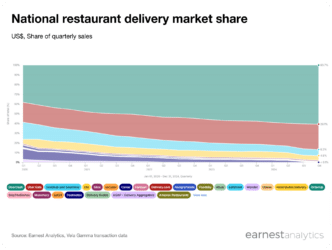Jason & Scot Show: Temu Deep Dive with Earnest Analytics
Michael Maloof, Head of Marketing for Earnest Analytics, joined Jason Goldberg and Scot Wingo on the latest episode of the Jason & Scot Show, a weekly podcast with the latest e-commerce news and events. The topic of discussion was Temu, the online marketplace operated by the Chinese e-commerce company PDD Holdings, which has become the fastest growing retailer in history.
This episode covers Temu’s growth, who their customers are, which retailers they are likely impacting, their go-to-market strategy, and some potential risks. Key quotes from the conversation:
Michael Maloof on Temu’s explosive growth: “Temu’s growing very quickly. From late 2022 onwards, our data is showing double-digit month-to-month growth, which is just explosive, as it became a household name. In the first three months, for context, it had roughly as many weekly active users in the US as the largest fast fashion brand, Shein, and within 10 months had surpassed Shein in sales. And it had taken Shein years to get to that point. So really, a much shorter timeline. For an idea of size, about 18% of US households have shopped at Temu since its launch.”
On Temu’s high-income customer base: “Despite the really low price points and that gamified discount system, Temu’s US customer base skews middle to high income, actually. Sales among customers earning over $190K are the fastest growing income bracket…today, about 44% of Temu sales come from earners making over $130K. We just think that Temu resonates mostly with customers with more disposable income, people who can afford to take a gamble on an item that might not work out.”
On Temu’s Super Bowl spend and its impact: “For a young company like [Temu] facing slowing new customer growth, I’d imagine they’re looking to move the needle with each of these big marketing events and the data just suggests that their multiple ads on February 11th had no meaningful boost in sales. Actually, Temu saw a noticeable deceleration in sales growth following the event…sales were significantly slower in the next few days. So unless they’re measuring this on a much longer timeline, I don’t think this investment was worth it.”
On Temu’s positioning and their potential threat to competitors: “We need to think of [Temu] less as an Amazon killer, and more as a brand that just came in to consolidate the existing demand for this deep discount online spending that AliExpress and Wish kind of got off the ground in the US. In terms of the hobby space, Oriental Trading, Hobby Lobby, Party City, they all experienced double-digit declines year-on-year in February among the customers who also shopped at Temu. And these brands, they’re catering to occasional and discount merchandise. I think they’re really going to struggle adapting to Temu.”
On Temu’s potential challenges and ability to scale long-term: “I think people realize Temu is managing to disrupt Wish…but it does have the same limits as Wish and that this deep discount model doesn’t have the big household brands that people want when they’re making those everyday purchases that are slightly bigger, like the Tides and Cloroxes. There are just some things you don’t want to replace and you don’t want to gamble on. It’s just going to be tough for [Temu] to scale at some point. I think the question we should be asking is if they’ve reached that point yet. I’m not sure. The sales growth slowing suggests they could have. But in the meantime, they are actually taking a wrecking ball to several other brands. So just because total sales is slowing doesn’t mean the disruptive effect is slowing.”











